09 Nov2020
By Jerrica Thurman

AACTE is collaborating with Edthena to provide $500,000 in grant funding to teacher education programs for Spring 2021.
AACTE member institutions may apply by December 7, 2020, to receive up to $25,000 for implementing video observation technology to support their teacher candidates during COVID-19 and beyond. Through this partnership, up to twenty AACTE members will receive grants for the upcoming Spring 2021 academic term.
A leader in video observation and collaboration technology, Edthena is widely used by schools, districts, and teacher education programs across the country. The technology platform enables teacher candidates to upload videos of their practice and faculty to provide feedback at specific moments in time. An approved edTPA platform provider, Edthena’s video technology can be utilized in methods courses, field observations, edTPA skill building, and group learning, making it possible to capture data for candidate growth and program improvement.
09 Nov2020
By Meghan Grenda

As an AACTE member you have most likely accessed educator preparation resources, attended webinars or downloaded presentations via the AACTE Resource Library, but have you visited the online Career Center?
The AACTE Career Center is your one-stop shop for teacher education students and professionals. Whether you are a seasoned educator searching for the best fit, a student embarking on your career journey, or an educator preparation provider seeking highly-qualified talent, the Career Center’s job board and resume resources are here to help. The Career Center features
- 700+ employer profiles
- 500+ job seeker profiles
- 9,000+ positions
03 Nov2020
By Katrina Norfleet
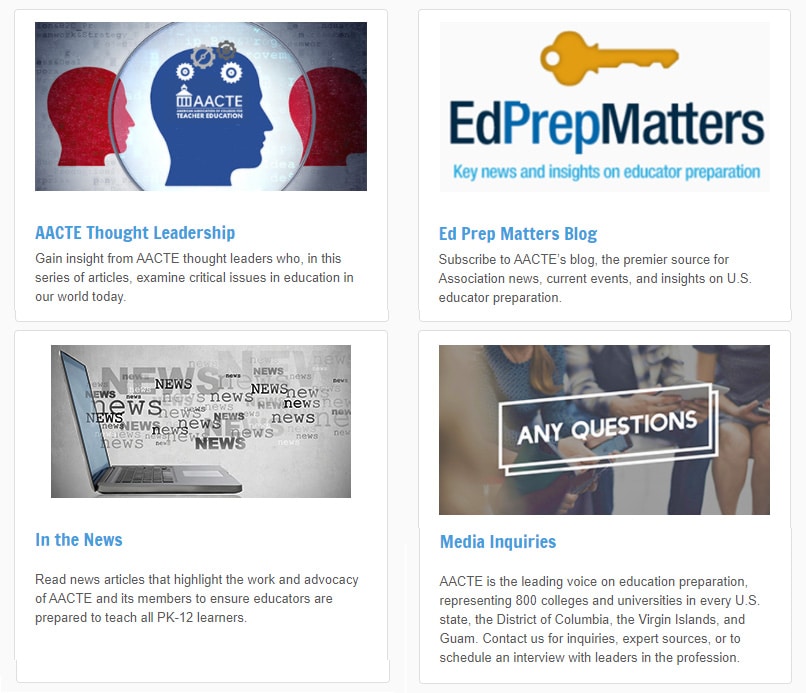 Have you visited the AACTE online News Room lately? While the News Room is the primary tool used by AACTE to increase the visibility of the educator preparation community, this resource is not only for journalists. AACTE has designed its news hub as a virtual repository of articles, information, and trends in the field to help its members stay up to date on timely education and educator preparation topics.
Have you visited the AACTE online News Room lately? While the News Room is the primary tool used by AACTE to increase the visibility of the educator preparation community, this resource is not only for journalists. AACTE has designed its news hub as a virtual repository of articles, information, and trends in the field to help its members stay up to date on timely education and educator preparation topics.
As a member-based organization, AACTE is keenly positioned to be a collective voice for the educator preparation community. When you want to know how the Association leadership is responding on behalf of AACTE to national events and federal issues that directly impact education and educators nationwide, visit the Press Release & Statements section. Read AACTE’s public comment on actions that range from the push to reopen schools during the COVID-19 pandemic to the most recent statement on the Administration’s restriction of federal funding for critical race theory training in education. This section also houses news releases, offering you updates on the work your Association is generating to assure educators are profession-ready when they enter the classroom, such as research reports, partnerships with other educator preparation-based organizations, and AACTE professional development events (Annual Meetings, Leadership Academy and Washington Week).
27 Oct2020
By Ward Cummings

Election season is upon us. According to CNN, more than 50 million Americans have already cast their ballot in the 2020 election by mail or by early voting. Some predict that as many as two-thirds of the electorate will have voted before election day arrives on November 3. The remaining third of Americans will go to their neighborhood polling place next Tuesday and cast their vote in person for the men and women they want to see run their cities, municipalities, states and the country. Across the nation, hundreds of political offices are up for grabs and thousands of men and women have registered to have their names placed on the ballot. Some of the names will be familiar to voters, many more will not be. For those seeking information about candidates and candidate positions on education, AACTE is keenly positioned to help.
23 Oct2020
By Jacqueline E. King, Ph.D.
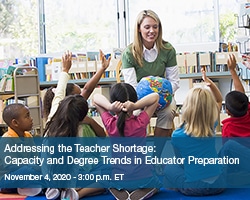 Before the coronavirus pandemic, there were significant teacher shortages in many communities. Since the pandemic began, teacher retirements and other departures from the profession have accelerated. Can the nation’s higher education institutions meet the demand for new teachers, particularly in high-demand fields such as special education, STEM, and foreign language? What do trends over the last decade portend for the future of educator preparation?
Before the coronavirus pandemic, there were significant teacher shortages in many communities. Since the pandemic began, teacher retirements and other departures from the profession have accelerated. Can the nation’s higher education institutions meet the demand for new teachers, particularly in high-demand fields such as special education, STEM, and foreign language? What do trends over the last decade portend for the future of educator preparation?
An upcoming webinar will review the findings from two new AACTE issue briefs that address these questions:
- Institutions Offering Degrees in Education: 2009-10 to 2018-19
- Degree Trends in High-Demand Teaching Specialties: 2009-10 to 2018-19
22 Oct2020
By AACTE
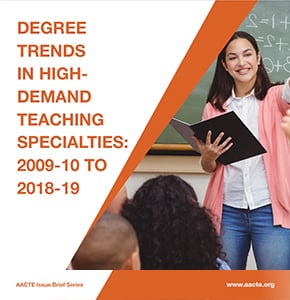
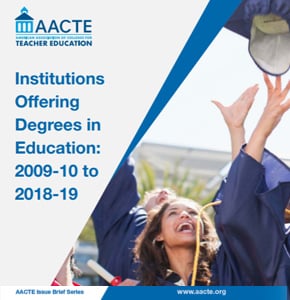
The American Association of Colleges for Teacher Education (AACTE) released today two new issue briefs, Institutions Offering Degrees in Education: 2009-10 to 2018-19 and Degree Trends in High-Demand Teaching Specialties: 2009-10 to 2018-19. The reports examine education trends through an analysis of the number of institutions awarding degrees in education and the imminent threat of increased teacher shortages , particularly in high-demand areas. The findings raise significant concerns about the nation’s future capacity to produce new teachers and other education professionals to meet the diverse needs of students, families, and communities.
The Institutions Offering Degrees in Education report describes the number of institutions awarding degrees in education from 2009-10 to 2018-19, and offers a table listing of institutions awarding any degree in education by state and institution type during this period. It reveals that, while the number of institutions offering degrees in education has been stable, the number of institutions with small programs, defined as awarding 30 or fewer degrees and certificates annually, rose by 21%. These institutions currently make up one-third of all colleges and universities awarding education degrees. Of critical importance is that the average number of education graduates across all institution types fell by 24% from 2009-10 to 2018-19.
20 Oct2020
By Meghan Grenda
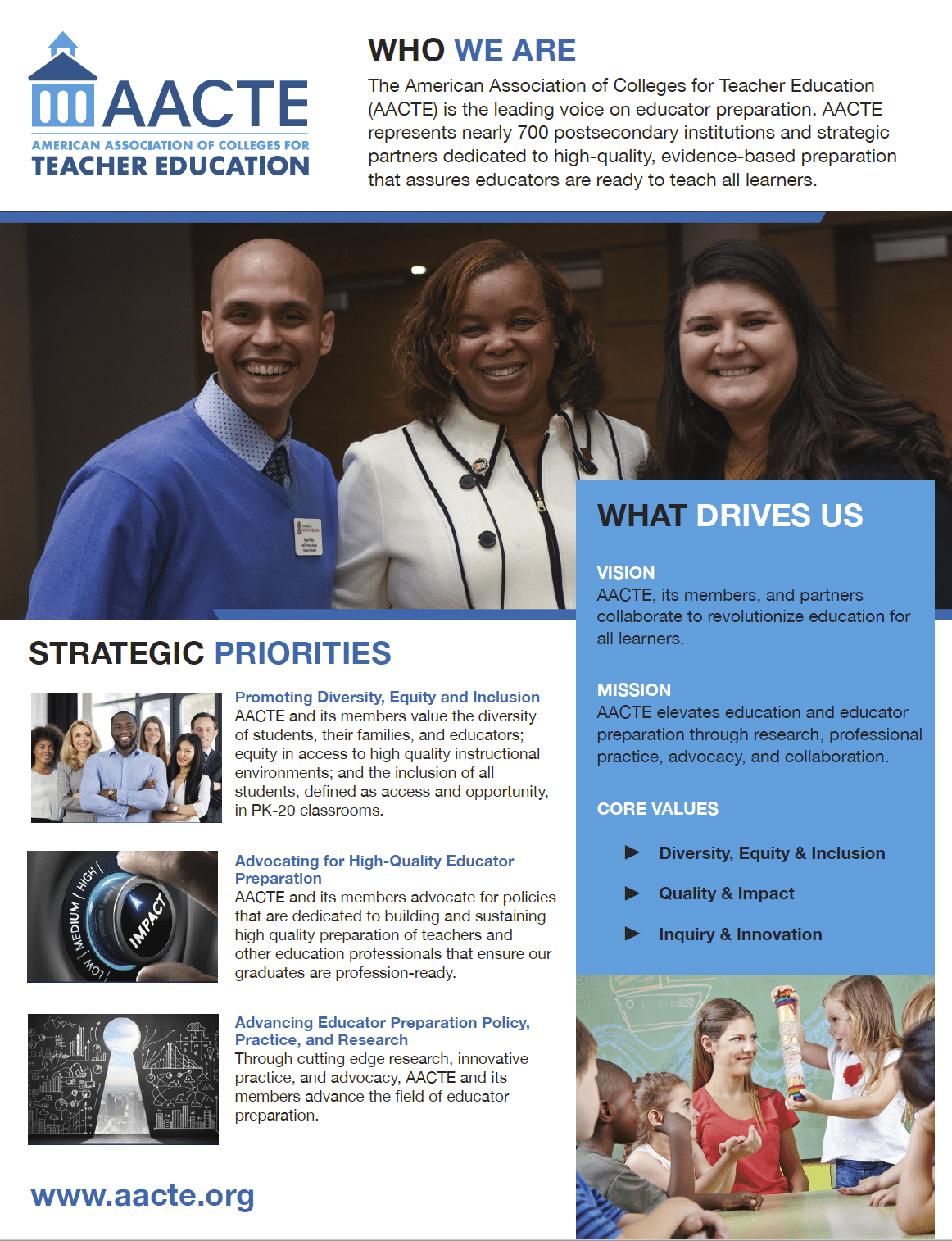 Did you know the AACTE member community is over 15,000 strong? AACTE membership is institutional—meaning when the university or college joins, all students, faculty, staff, and administrators also become members—with over 17,000 individuals served. These members represent nearly 700 postsecondary institutions and strategic partners who are dedicated to high-quality, evidence-based preparation that assures educators are ready to teach all learners.
Did you know the AACTE member community is over 15,000 strong? AACTE membership is institutional—meaning when the university or college joins, all students, faculty, staff, and administrators also become members—with over 17,000 individuals served. These members represent nearly 700 postsecondary institutions and strategic partners who are dedicated to high-quality, evidence-based preparation that assures educators are ready to teach all learners.
Member institutions include public and private schools both large and small from across the country. AACTE serves members with less than 25 graduates all the way up to institutions with over 1,000 graduates from all 50 states.
AACTE has released its latest membership tool, a one-page profile that shares members statistics and much more, including strategic priorities, educational offerings, and professional development opportunities.
AACTE’s strategic priorities: Promoting diversity, equity and inclusion; advocating for high-quality educator preparation; and advancing educator preparation policy, practice, and research are what guides the association’s mission, vision, and core values. AACTE members and partners revolutionize education for all learners and elevate educator preparation through research, professional practice, advocacy, and collaboration while maintaining a commitment to diversity, equity, inclusion, quality, and innovation.
15 Oct2020
By Lynn M. Gangone
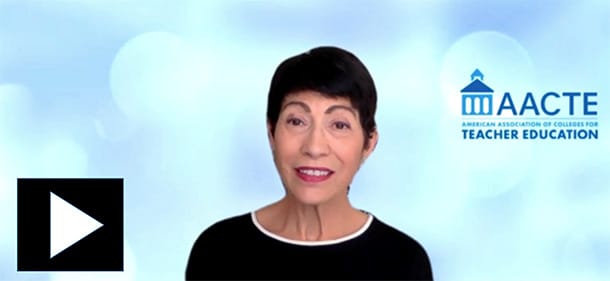
AACTE kicks off our inaugural, virtual Leadership Academy Series today, where participants will learn best practices for “Leading During Difficult Times.” Providing you timely and relevant professional development opportunities and resources to advance your institution, your programs, and your career is central to our mission at AACTE. Please take a few minutes to watch the video above and learn more about opportunities to engage with your Association.
AACTE released yesterday its latest issue brief on financial challenges facing future teachers. You may access the member-only resource at aacte.org. Your feedback on how AACTE can continue to support your work is valuable so be sure to complete the Fall Member Survey by November 6. And remember your voice truly matters; make your voice heard in the upcoming presidential election. Your voice, your vote!
13 Oct2020
By AACTE
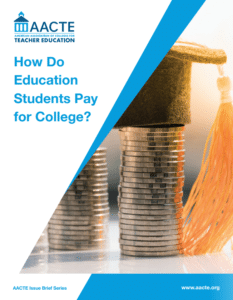 The American Association of Colleges for Teacher Education (AACTE) released today its latest issue brief, How Do Education Students Pay for College? The report provides colleges of education a closer look at the financial pressures impacting education students, by type of institution attended and by student race and ethnicity, through a detailed examination of the costs they face and the financial sources they use to pay those expenses. The findings reveal the financial challenges future educators will face and the financial disincentives to pursuing a teaching career, especially for students of color. It also supports the necessity of compensating educators fairly, in particular novice teachers who may be most burdened by student loan debt.
The American Association of Colleges for Teacher Education (AACTE) released today its latest issue brief, How Do Education Students Pay for College? The report provides colleges of education a closer look at the financial pressures impacting education students, by type of institution attended and by student race and ethnicity, through a detailed examination of the costs they face and the financial sources they use to pay those expenses. The findings reveal the financial challenges future educators will face and the financial disincentives to pursuing a teaching career, especially for students of color. It also supports the necessity of compensating educators fairly, in particular novice teachers who may be most burdened by student loan debt.
“The global pandemic has deepened the national teacher shortage crisis. It is critical now more than ever to recruit diverse, talented people into the teaching profession, which requires our nation’s leaders to revamp policies and practices that make college affordable and increase teacher compensation,” said Lynn M. Gangone, president and CEO of AACTE.
07 Oct2020
By Jacqueline E. King, Ph.D.
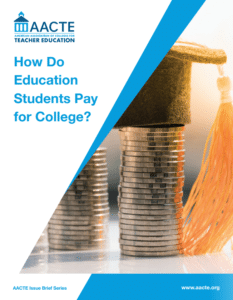 There is a growing body of research suggesting that concerns about compensation generally—and about being able to repay student loans in particular—are dissuading college students from choosing teaching as a career. These financial concerns have only been exacerbated by COVID-19 and its attendant financial crisis.
There is a growing body of research suggesting that concerns about compensation generally—and about being able to repay student loans in particular—are dissuading college students from choosing teaching as a career. These financial concerns have only been exacerbated by COVID-19 and its attendant financial crisis.
To help members better understand the financial pressures impacting education students, AACTE has released the new How Do Education Students Pay for College? issue brief that takes a detailed look at how students pursuing a bachelor’s degree in education pay for college, including the costs they face and the financial sources they tap to meet those expenses.
On Wednesday, October 21 from 3:00 – 4:00 p.m. ET, AACTE will host a webinar on this important topic. As the issue brief’s author, I will review the research findings, and I’ll be joined by AACTE consultant Jane West for a discussion of the implications of these findings for campus practice and federal policy. West will also share AACTE’s priorities for strengthening aid to future educators in federal appropriations bills as well as the reauthorization of the Higher Education Act.
The one-hour session will feature time for questions and discussion.
Register now.
02 Oct2020
By Brigid Brennan and Hannah Dennis
This article is part of a series on clinically rich teacher preparation in New York State, coordinated by Prepared To Teach at Bank Street College. The text is adapted from their latest report, Making Teacher Preparation Policy Work: Lessons From and For New York, and shared by the featured institution.
 Bank Street Graduate School of Education is a small, progressive institution in New York City, founded in 1916. Bank Street has a long history of pioneering innovative, inclusive education programs, dating back to the founding of Head Start.
Bank Street Graduate School of Education is a small, progressive institution in New York City, founded in 1916. Bank Street has a long history of pioneering innovative, inclusive education programs, dating back to the founding of Head Start.
One of Bank Street’s newest programs—the Early Childhood Urban Education Initiative—helps uncredentialed early childhood educators in under-resourced New York City neighborhoods complete their certification and earn master’s degrees while remaining employed in their existing early childhood classrooms.
The educators who enroll in the program often come from the communities in which they teach and, as they progress through the rigorous program, they are able to bring their knowledge and skills to bear on the students in their classrooms, the organizations in which they are housed, and the community overall. By completing a master’s degree and obtaining their certification, participants in this initiative gain access to a wider set of professional opportunities.
25 Sep2020
By Patricia Russo
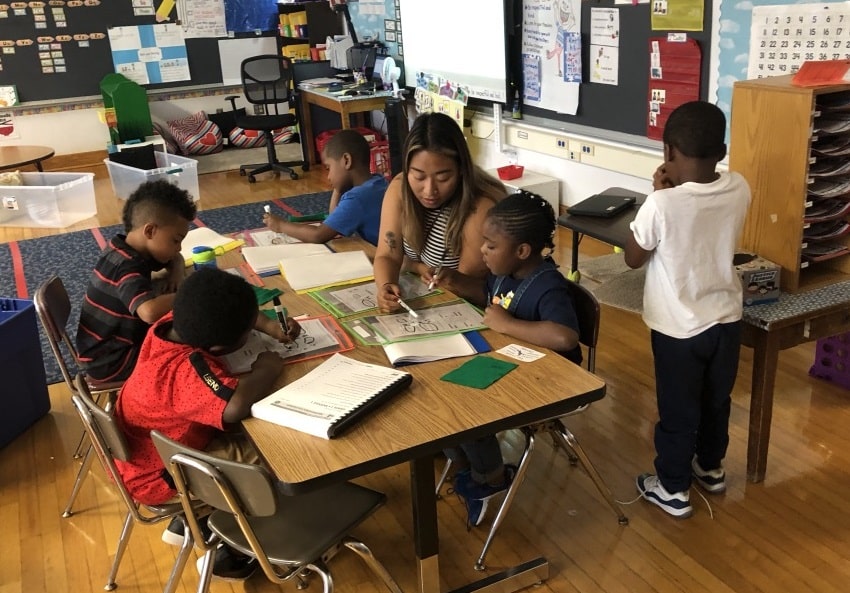 This article is part of a series on clinically rich teacher preparation in New York State, coordinated by Prepared To Teach at Bank Street College. The text is adapted from their latest report, Making Teacher Preparation Policy Work: Lessons From and For New York, and shared by the featured institution.
This article is part of a series on clinically rich teacher preparation in New York State, coordinated by Prepared To Teach at Bank Street College. The text is adapted from their latest report, Making Teacher Preparation Policy Work: Lessons From and For New York, and shared by the featured institution.
Syracuse, New York is home to a longstanding residency partnership between SUNY Oswego and Syracuse City School District (SCSD). The district and university first developed the residency with resources obtained through New York State’s Clinically Rich Teacher Preparation Pilot in 2012.
When planning for the residency, partners recognized a particularly promising model inside the master’s level Childhood Education program. By placing residents inside schools as cohorts, committing substantive faculty time to those same schools, and providing time inside the school day for planning, collaboration, and reflection between residents and mentor teachers teams, and between those teams and program faculty, the residency model has become more than a high-quality preparation pathway for teacher candidates—it’s a part of each school’s culture and approach to strengthened teaching and learning inside its classrooms. “We’ve seen the residency model evolve over time as we plan, collaborate, and adjust our approaches, which allows us to be responsive to new goals and identified needs at the university or district level,” says Associate Dean Kristen Munger.
08 Sep2020
By Katrina Norfleet
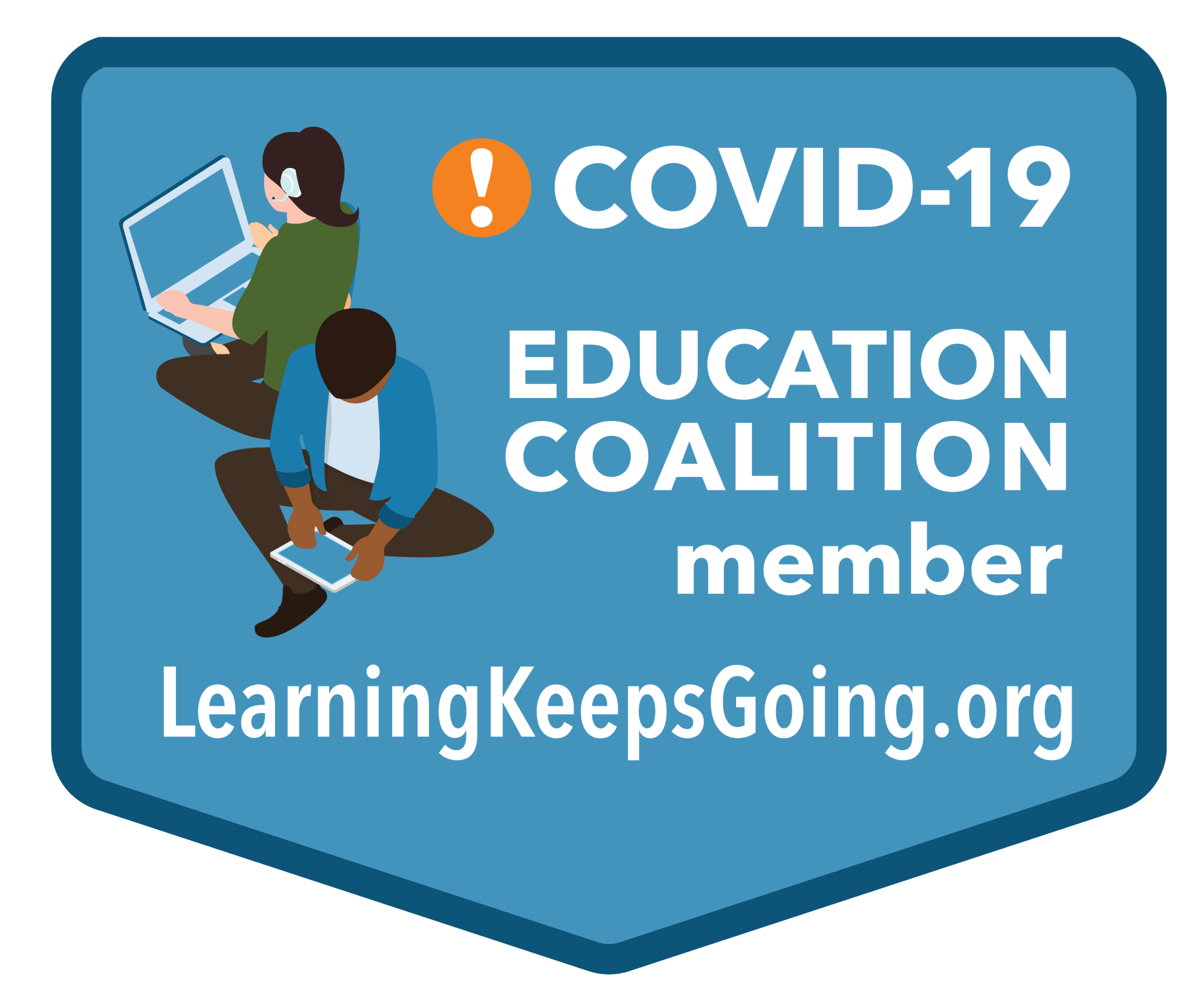 Now that technology is playing a larger role than ever before in teaching and learning, the COVID-19 Education Coalition has curated a list of resources on keeping technology systems safe, protecting student data, and promoting healthy digital decision-making in the newly released A Learning System for Privacy, Security and Digital Citizenship Infrastructure.
Now that technology is playing a larger role than ever before in teaching and learning, the COVID-19 Education Coalition has curated a list of resources on keeping technology systems safe, protecting student data, and promoting healthy digital decision-making in the newly released A Learning System for Privacy, Security and Digital Citizenship Infrastructure.
As a member of the COVID-19 Education Coalition, AACTE invites members to access this informational resource. It was created to do the following: understand the relationship between privacy and security as well as have models of effective practices in safeguarding student data; understand the roles, responsibilities, and rights of students in virtual learning environments; and understand the numerous stakeholders playing a role in student “data stewardship” and “digital citizenship” (i.e., teachers, administrators, parents, vendors, and the students themselves) and how their role is critical for both short- and long-term success.
08 Sep2020
By Jacqueline E. King, Ph.D.
After a highly successful tenure, it is time for Michigan State University to hand over the reins of AACTE’s premier publication to a new campus-based team. The Journal of Teacher Education (JTE) is a 120-page refereed scholarly publication on teacher education policy, practice, and research. It is published five times each year; the editors typically receive more than 800 articles annually, of which about 40 are published.
The JTE editor is responsible for editorial administration of the journal. This includes receiving and screening manuscripts; coordinating the blind peer-review process; substantive editing; working with authors on revisions; selecting and organizing final articles for each issue; writing an editorial; and transmitting print-ready issue copy to SAGE Publications, Inc., which provides copy editing, layout, and printing services for the journal and manages its subscription, distribution, and marketing activities.
Proposals to serve as the editorial team for JTE are due on October 1 (see this blog post for more information and a link to the RFP).
If you plan to submit a proposal, what should you be considering? A successful proposal will provide comprehensive answers to the following key questions:
27 Aug2020
By Nicole Dunn
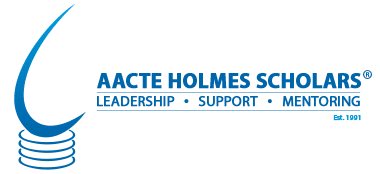 Having a Holmes Program at your institution is an excellent way to provide professional development and student support for racially diverse candidates in educator preparation programs (EPPs). With the upcoming financial challenges COVID-19 will bring to funding efforts that will lead to diversification in the field, AACTE is committed to helping provide those development opportunities with a new resource—the Holmes Program Coordinators Directory.
Having a Holmes Program at your institution is an excellent way to provide professional development and student support for racially diverse candidates in educator preparation programs (EPPs). With the upcoming financial challenges COVID-19 will bring to funding efforts that will lead to diversification in the field, AACTE is committed to helping provide those development opportunities with a new resource—the Holmes Program Coordinators Directory.
Are you interested in expanding or creating a Holmes Program? AACTE Holmes Program Coordinators have the experiential knowledge to share with those looking to learn more about the benefits and logistics to starting a Holmes Program at the Masters or Doctoral level. You can learn more by accessing the new Holmes Program Coordinators Directory in the AACTE Resource Library.









 Have you visited the AACTE online News Room lately? While the News Room is the primary tool used by AACTE to increase the visibility of the educator preparation community, this resource is not only for journalists. AACTE has designed its news hub as a virtual repository of articles, information, and trends in the field to help its members stay up to date on timely education and educator preparation topics.
Have you visited the AACTE online News Room lately? While the News Room is the primary tool used by AACTE to increase the visibility of the educator preparation community, this resource is not only for journalists. AACTE has designed its news hub as a virtual repository of articles, information, and trends in the field to help its members stay up to date on timely education and educator preparation topics.
 Before the coronavirus pandemic, there were significant teacher shortages in many communities. Since the pandemic began, teacher retirements and other departures from the profession have accelerated. Can the nation’s higher education institutions meet the demand for new teachers, particularly in high-demand fields such as special education, STEM, and foreign language? What do trends over the last decade portend for the future of educator preparation?
Before the coronavirus pandemic, there were significant teacher shortages in many communities. Since the pandemic began, teacher retirements and other departures from the profession have accelerated. Can the nation’s higher education institutions meet the demand for new teachers, particularly in high-demand fields such as special education, STEM, and foreign language? What do trends over the last decade portend for the future of educator preparation? 

 Did you know the AACTE member community is over 15,000 strong? AACTE membership is institutional—meaning when the university or college joins, all students, faculty, staff, and administrators also become members—with over 17,000 individuals served. These members represent nearly 700 postsecondary institutions and strategic partners who are dedicated to high-quality, evidence-based preparation that assures educators are ready to teach all learners.
Did you know the AACTE member community is over 15,000 strong? AACTE membership is institutional—meaning when the university or college joins, all students, faculty, staff, and administrators also become members—with over 17,000 individuals served. These members represent nearly 700 postsecondary institutions and strategic partners who are dedicated to high-quality, evidence-based preparation that assures educators are ready to teach all learners. 
 The American Association of Colleges for Teacher Education (AACTE) released today its latest issue brief,
The American Association of Colleges for Teacher Education (AACTE) released today its latest issue brief,  There is a growing body of research suggesting that concerns about compensation generally—and about being able to repay student loans in particular—are dissuading college students from choosing teaching as a career. These financial concerns have only been exacerbated by COVID-19 and its attendant financial crisis.
There is a growing body of research suggesting that concerns about compensation generally—and about being able to repay student loans in particular—are dissuading college students from choosing teaching as a career. These financial concerns have only been exacerbated by COVID-19 and its attendant financial crisis. Bank Street Graduate School of Education is a small, progressive institution in New York City, founded in 1916. Bank Street has a long history of pioneering innovative, inclusive education programs, dating back to the founding of Head Start.
Bank Street Graduate School of Education is a small, progressive institution in New York City, founded in 1916. Bank Street has a long history of pioneering innovative, inclusive education programs, dating back to the founding of Head Start. This article is part of a series on clinically rich teacher preparation in New York State, coordinated by
This article is part of a series on clinically rich teacher preparation in New York State, coordinated by  Now that technology is playing a larger role than ever before in teaching and learning, the COVID-19 Education Coalition has curated a list of resources on keeping technology systems safe, protecting student data, and promoting healthy digital decision-making in the newly released
Now that technology is playing a larger role than ever before in teaching and learning, the COVID-19 Education Coalition has curated a list of resources on keeping technology systems safe, protecting student data, and promoting healthy digital decision-making in the newly released  Having a
Having a